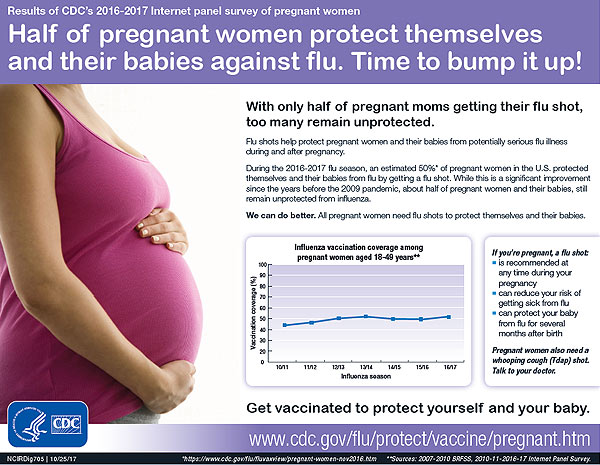
Some of these antibodies then pass onto your baby during your pregnancy and may also be passed through breast milk. You can get the flu vaccine at any stage of pregnancy.
CDC recommends getting a flu vaccine by the end of October despite flu seasons varying in their timing from season to season.
Influenza vaccine while pregnant. Getting an influenza flu vaccine is the first and most important step in protecting against flu. Pregnant women should get a flu shot and not the nasal spray flu vaccine. Flu shots given during pregnancy help protect both the mother and her baby from flu.
Vaccination has been shown to reduce the risk of flu-associated acute respiratory infection in pregnant women by up to one-half. Pregnant women are considered the most important risk group for influenza vaccination. Despite this the potential risk of harm from the vaccine on the fetus is a key factor in low uptake of the vaccine.
The Centers for Disease Control and Prevention CDC recommend that everyone 6 months of age and olderincluding pregnant women and women who are breastfeedingget the flu vaccine each year. If you are pregnant it is best to get the vaccine early in the flu season October through May as soon as the vaccine is available. You can get the shot at any time during your pregnancy.
If you are not. Get a flu shot anytime during each pregnancy. CDC recommends getting a flu vaccine by the end of October despite flu seasons varying in their timing from season to season.
This timing helps protect a pregnant woman before flu activity begins to increase. Pregnant women are more likely to have an influenza vaccination when they feel more susceptible to influenza perceive greater vaccine effectiveness are recommended to do so by a healthcare provider anticipate greater regret for not being vaccinated and express fewer concerns about potential adverse side effects to themselves and their baby CDC 2011 Fisher et al 2011 Fridman et al. Influenza vaccine uptake in pregnant women was 27.
Women who had received a recommendation to have the vaccine were 200 times 95 CI 109-369 more likely to have been vaccinated. Forty-two per cent recalled receiving a recommendation to be vaccinated. Women who are or will be pregnant during influenza season should receive IIV.
Influenza LAIV Live attenuated influenza vaccine LAIV is not recommended for use during pregnancy. 5 Top of Page. Measles Mumps Rubella MMR MMR vaccines should not be administered to women known to be pregnant or attempting to become pregnant.
Because of the theoretical risk to the fetus when the. You can get the flu shot at any time during your pregnancy. It takes at least two weeks to make antibodies after getting a flu vaccine and for pregnant women it might be up to four weeks.
Some of these antibodies then pass onto your baby during your pregnancy and may also be passed through breast milk. The influenza vaccine is free for pregnant women as part of the National Immunisation Program NIP. The influenza vaccine is recommended during every pregnancy and at any stage of your pregnancy.
Further information on why pregnant women should receive the influenza vaccine is available in the Protecting your baby against influenza starts when youre pregnant brochure. Researchers from the UC San Diego School of Medicine and Boston University in collaboration with the American Academy of Allergy Asthma and Immunology AAAAI have found evidence of the H1N1 influenza vaccines safety during pregnancy. The national study which was launched shortly after the H1N1 influenza outbreak of 2009 is.
You can get the influenza vaccine and pertussis vaccine at the same time during your pregnancy. You can also get them at different visits. This year due to the COVID-19 pandemic it is advised to get the influenza vaccine as soon as it is available regardless of what trimester of pregnancy you are in.
If you are pregnant you should get the flu vaccine because you are at increased risk of severe complications from flu. The vaccine protects you during pregnancy. You can get the flu vaccine at any stage of pregnancy.
You should get it as early as possible in your pregnancy. Vaccination against influenza flu during pregnancy is recommended for all women especially during flu season November to April. This is because flu is more likely to cause severe illness in pregnant women than in women who are not pregnant.
Vaccination with an inactivated flu vaccine lowers the risk for complications from flu during pregnancy and after your baby is born. As well as protecting mother and child from the effects of an influenza infection the immunization of pregnant women tends to increase their chances of experiencing a successful full-term pregnancy. The trivalent inactivated influenza vaccine is protective in pregnant women infected with HIV.
If you have questions or concerns regarding the flu vaccine while pregnant Miller encourages you to speak with your doctor first. She says pregnant women who get a. This vaccine can prevent serious illness in the mother during pregnancy.
All women who will be pregnant any trimester during the flu season should be offered this.
